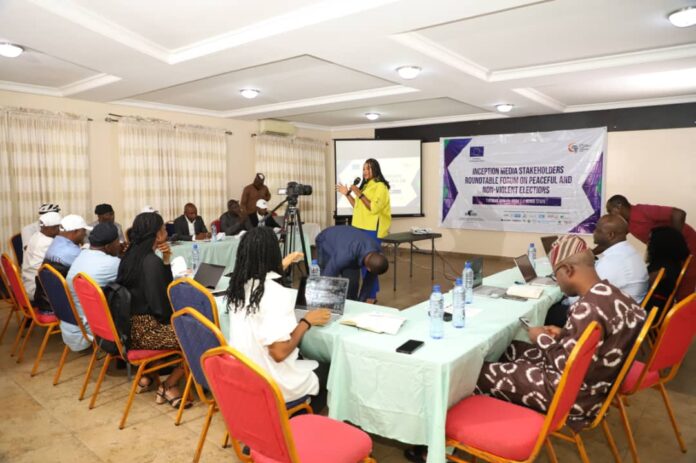From Msurshima Andrew, Makurdi
A Non Governmental Organization (NGO), Corporate Accountability and Public Participation Africa (CAPPA), has trained journalists in Benue State to produce conflict sensitive reports that will promote peace building and non-violent elections in the state.
The two day capacity building training, funded by the European Union, (EU), under its support for Democratic Governance in Nigeria (EU SDGN II) initiative aims to reinforce democracy in Nigeria by enhancing the quality of electoral administration and citizens’ participation in electoral processes.
Welcoming the participants in Makurdi, the Executive Director of CAPPA, Akinbode Oluwafemi, urged them to pay attention as the training was to meant expose them to the rudiment of media coverage of electoral process.
While noting that the media, as critical stakeholders, have a crucial role to play in fostering peace, in pre and post elections periods, the Executive Director in his paper titled “Expanding Nigeria’s Democracy and Civil Space: Journalists as Drivers for Sustainable Democracy”, charged the media to write their reports in a manner that promotes peaceful and non-violent elections in Nigeria.
Oluwafemi whose paper was presented by the CAPPA Policy and Research Manager, Zikorah Ibeh, said there is need to build the capacity of journalists to promote non biased reporting and become conversant with the nation’s electoral process.
He said journalists have the ability to effectively use their pen to shape the economic situation of Nigeria and hold government accountable to the people.
He acknowledged the role and contribution of the media towards the Nigeria independence and entrenchment of present democracy in Nigeria, saying that journalists remain critical stakeholders of electoral process in the country.
A resource person and Professor of Journalism at the Lagos State University, (LASU), Dr Tunde Akanni, while taking journalists through his paper, “Conflicts Sensitive Journalism: Election and Post-Election Roles of the Media” said that elections can be likened to wars as the period divide the society due to divergent political interests which in turns triggers development.
He painted a vivid picture of Nigeria’s historical struggles with conflicts, illustrating the necessity for intervention by both non-governmental and international organizations as well as the media in fostering peace and security.
He said “Mass media plays a vital role in shaping public discourse and influencing the outcome of elections. In the aftermath of elections, the media can either stoke tensions or promote reconciliation and peaceful transition of power.”
Akanni therefore called on media practitioners to be factual, accurate and always generate reports that could promote peace, on violent elections and reconciliation.
He advised that journalists must among other things shun sensationalized or partisan media coverage as such acts can inflame emotions and lead to
civil unrest, fuel misinformation.
He also noted that the spread of false or misleading information through the media can undermine
trust in the electoral process and urged Journalists to be mindful.
“Responsible media coverage that emphasizes unity and peaceful dialogue can help de-escalate tensions” before, during and after elections he advised.
The policy and legal drafting officer CAPPA, Shade Oyelade, educated participants on the details of the Electoral Act 2022 and the provisions of the law for the media reporting elections matters.
She said the media has constitutional responsibility as enshrined in section 39(1), section 39(2) of the constitution as amended to make the public know about what is happening at all times and called on journalists to focus on promoting transparent and peaceful elections and also hold those in leadership positions accountable.
Other resource persons, Blessing Oladunjoye and Abayomi Sarumi also presented papers on “Inclusive Election Reporting: Understanding the Elections and the Disability Act”, and “Fact Checking and Digital Media Trends” respectively, sharing practical ideas for promoting inclusive, peaceful and non-violent elections through balanced news reporting.
Oladunjoye particularly advised media practitioners to ensure inclusive election reporting by also focusing on the rights of Persons with Disabilities (PWDs), in the electoral process, understanding their needs, promoting fair representation and their participation and ensuring that the role of providing media coverage of election is accessible to all.
Some of the participants who spoke at the end of the training, Mr Shima Aondakaa, Babs Usigbe, John Shiaondo, Atah Ede among others, appreciated he European Union and CAPPA for the training and pledged to commitment to conflict sensitive journalism to promote peaceful polls.







